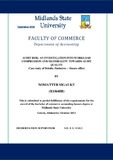Please use this identifier to cite or link to this item:
https://cris.library.msu.ac.zw//handle/11408/2835| Title: | Audit risk: an investigation into workload compression and materiality towards audit quality: case study of Deloitte Zimbabwe – Harare office | Authors: | Sigauke, Nomatter | Keywords: | Financial statements Audit |
Issue Date: | 2013 | Publisher: | Midlands State University | Abstract: | This research investigates the effects of applying materiality under workload compression demands, on the quality of audited financial statements. Carrying out interviews and distributing questionnaires to the audit staff, research found that application of materiality under workload compression conditions is literal and audits are of lower quality when compared to audits performed under non-workload compression conditions. Evidence was also found indicating that workload compression promotes auditors to engage in reduced audit quality acts. Thus, auditors do not adjust audit stubbornness with respect to identified misstatements in workload compressed firms. The research is of major contribution as it represents one of the few attempts to investigate the effects of workload compression and materiality application from a pragmatic perspective and besides using junior auditors as subjects, audit seniors were also included in the same manner of approach as well as interviewing managers. Since eventual review process (quality control checks) to an audit take place at the later stages of the audit after working papers and other necessary documentation are reviewed by senior auditors and managers, this study provides evidence that workload compression affects audit quality across all levels of the audit firm staff. The findings of this study draw attention for the need of espousing regulations that would evenly spread auditors’ workloads year wide. For example, innovative policies might be set in order to limit the number of firms with a December fiscal year-end date or increase the proportion of procedures that auditors are sanctioned to perform before regarding and accepting account balances as immaterial. This could be implemented in an attempt to harmonize discharge of professional judgment in the determination of materiality thresholds. | URI: | http://hdl.handle.net/11408/2835 |
| Appears in Collections: | Bachelor Of Commerce Accounting Honours Degree |
Files in This Item:
| File | Description | Size | Format | |
|---|---|---|---|---|
| R10640B.pdf | Full Text | 2.23 MB | Adobe PDF |  View/Open |
Page view(s)
154
checked on Feb 12, 2026
Download(s)
80
checked on Feb 12, 2026
Google ScholarTM
Check
Items in MSUIR are protected by copyright, with all rights reserved, unless otherwise indicated.



